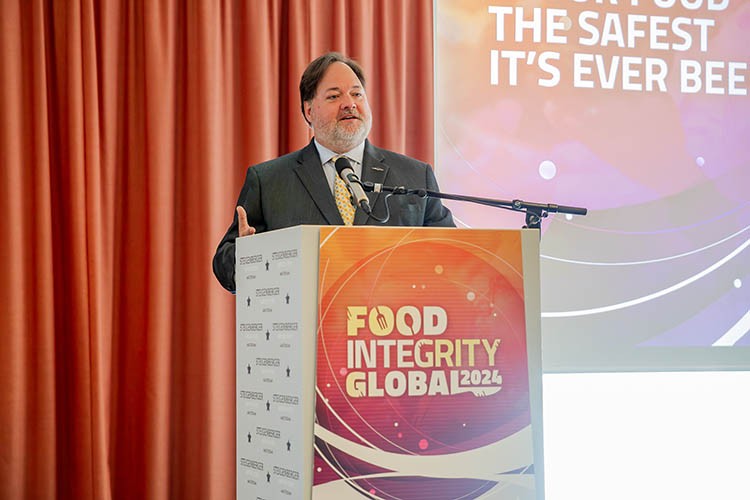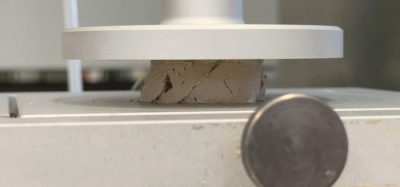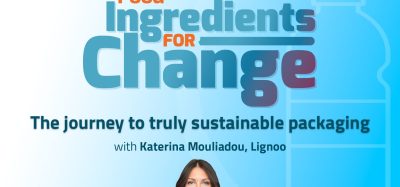Protecting every plate: insights from an American food safety expert at Food Integrity Global 2024
- Like
- Digg
- Del
- Tumblr
- VKontakte
- Buffer
- Love This
- Odnoklassniki
- Meneame
- Blogger
- Amazon
- Yahoo Mail
- Gmail
- AOL
- Newsvine
- HackerNews
- Evernote
- MySpace
- Mail.ru
- Viadeo
- Line
- Comments
- Yummly
- SMS
- Viber
- Telegram
- Subscribe
- Skype
- Facebook Messenger
- Kakao
- LiveJournal
- Yammer
- Edgar
- Fintel
- Mix
- Instapaper
- Copy Link
Posted: 20 September 2024 | Dr Darin Detwiler | No comments yet
Here, renowned food safety expert Dr Darin Detwiler shares his experience and takeaways from Food Integrity Global 2024…


Dr Darin Detwiler performing his keynote speech at Food Integrity Global 2024 in Amsterdam. Credit: Emily Dews Photography
As an American food safety professional who has spent decades immersed in the complexities of food integrity, attending Food Integrity Global 2024 in Amsterdam was nothing short of eye-opening. Hosted by New Food, this event exceeded my expectations in every way, bringing together experts, leaders and stakeholders from across the globe. With a reputation as an industry thought leader, I arrived ready to share my perspectives but left humbled by the sheer scale of the event and the collective knowledge that was present.
New Food did a remarkable job orchestrating this international forum, ensuring every conversation, keynote and panel discussion delved into the pressing topics of our industry: food safety, food fraud, sustainable development, food delivery, clean labelling, allergens and even the emergence of cultured meats. As a keynote speaker, I was privileged to contribute to these discussions, addressing a question that has been on many minds lately: “Is Our Food the Safest It Has Ever Been?” However, the real value of this conference lay not in one keynote but in the dialogue that followed—conversations that have fundamentally shifted my perspective on food safety as a global endeavour.
The European approach: a lesson in unity and cooperation
One of the most striking observations I made at the conference was the European approach to food safety—an approach deeply rooted in unity and cooperation across political and cultural borders. In Europe, food safety is part of a regulatory framework that transcends individual nations, with laws and policies shaped by a shared commitment to protecting consumers. Even in the UK, now outside of the EU post-Brexit, conversations at the event still emphasised alignment with regional food safety standards, showing a remarkable continuity in policies and practices.
New Food’s execution of the event masterfully showcased this pan-European perspective. Through various panel discussions and networking sessions, it became clear that European consumers trust their regulatory systems to ensure that food products meet stringent safety and quality standards. This is in stark contrast to the North American model, where food safety often depends on market-driven solutions and a complex patchwork of national regulations. Yet, despite these differences, one undeniable truth emerged: consumers everywhere share the same expectation: if it’s not safe, it’s not food.
A wake-up call for an American expert
For me, this conference was a wake-up call. As an American, I often view food safety through a domestic lens, focusing on US regulations, consumer expectations and industry practices. But Food Integrity Global 2024 forced me to confront the reality that food safety is an inherently global issue. Our food supply chains are interconnected, and the safety of products on American shelves depends on the integrity of practices worldwide. New Food’s expert curation of content and discussions allowed me to see this more clearly than ever before.
One particularly enlightening session revolved around the EU’s new deforestation legislation, which extends beyond food products to include the animal feed supply chain. This holistic approach to food integrity tackles both food fraud and environmental concerns, offering a model of comprehensive oversight that consumers increasingly demand. It struck me that the American food industry could learn much from this strategy, integrating sustainability and transparency into our broader definition of food safety.
The universal cost of food safety
A theme that resonated throughout the event was the cost of food safety—a universal concern for producers and manufacturers everywhere. One of the most compelling discussions I participated in was around the financial burden that small-scale dairies face in meeting certification, inspection and validation requirements. The room was abuzz with the recognition that, while food safety does come at a cost, the price of inaction is far greater.
New Food deserves applause for facilitating these candid conversations about the economic realities of food safety. It became evident that European companies, much like their North American counterparts, are grappling with balancing investment in safety measures with consumer demands for affordability and accessibility. The message from the conference was clear: consumers may not know the exact costs involved in ensuring food safety, but they expect companies to make these investments regardless. This shared understanding among global stakeholders reinforced that food safety is not just a business necessity—it’s a moral imperative.
Technology as a tool for trust
The event also highlighted the role of technology in meeting consumer expectations for food safety and transparency. I was particularly impressed by the advancements in rapid testing technologies coming out of Switzerland. These tools offer earlier and more frequent detection of contaminants and are gradually making their way to North American markets. Such innovations align directly with consumers’ demands for safe, transparent supply chains, ensuring that every plate is protected.
Another point of interest were disruptive technologies. European stakeholders at the conference spoke about AI and blockchain in concrete terms, discussing specific platforms and their long-term integration into food safety strategies. This approach contrasts with the more tentative, platform-agnostic conversations I often encounter in the US, where various digital solutions are still seen by many as a concept rather than an established tool. Here again, New Food’s meticulous programming ensured these discussions were not just theoretical but filled with actionable insights, emphasising that the time for adopting these technologies is now.
The global mindset shift: my personal transformation
The most significant takeaway for me was the need for a mindset shift within the food industry. I have long been focused on food safety within the US, but attending Food Integrity Global 2024 expanded my view. New Food crafted an environment where US perspectives were part of a much larger dialogue, enabling me to break free from traditional thinking and embrace a more global outlook. I realised that talking about America’s safe food supply means nothing if we do not address food safety on a global scale.
Mid-flight, on my return to the States, I made a decision that will reshape my work going forward. I resolved to spend more time internationally, engaging with global stakeholders and learning from the collective expertise around the world. It’s no longer sufficient to focus on domestic policies or practices; we must consider how every link in the global food chain impacts consumer trust and safety. The incredible job New Food did in curating these discussions made this revelation possible and set a new standard for how food industry events should be organised.
Building a safer future: a call to action for industry professionals
Reflecting on my time in Amsterdam, I feel a deep sense of optimism and urgency. New Food provided a platform for us to recognise that, while our food supply is more complex than ever, the commitment to food safety is growing stronger. The courage, expertise and dedication of industry leaders at this conference made one thing abundantly clear: protecting every plate is a shared journey that transcends borders.
As professionals in the food industry, we must adopt this global mindset. The consumer perspective may have regional nuances, but the fundamental expectation is the same: “It’s not food unless it’s safe food.” We have an opportunity—and a responsibility—to align our efforts with this universal standard.
I commend New Food for orchestrating an event that not only fostered this essential dialogue but also inspired action. Now, it’s up to all of us, whether in Europe, North America, or beyond, to take these insights and drive meaningful change as we protect every plate. Together, we can build a future where every bite consumers take is not just safe but trusted, no matter where in the world it comes from.
About the author
Dr Darin Detwiler is a renowned food safety academic, adviser, advocate and author. As the Founder and CEO of Detwiler Consulting Group, he has earned numerous awards, reflecting his iconic status in food safety. His career, spanning over 30 years, is highlighted in the Emmy-nominated Netflix documentary “Poisoned: The Dirty Truth about Your Food.” Dr Detwiler has significantly influenced food safety policies through roles with the USDA, FDA and NGOs. He is a professor at Northeastern University, and his work has appeared in various media and publications, including his books Food Safety: Past, Present, and Predictions and Building the Future of Food Safety Technology. Notably, he is the recipient of the International Association for Food Protection’s 2022 Ewen C.D. Todd Control of Foodborne Illness Award as well as their 2018 Distinguished Service Award for dedicated and exceptional contributions to the reduction of risks of foodborne illness.







